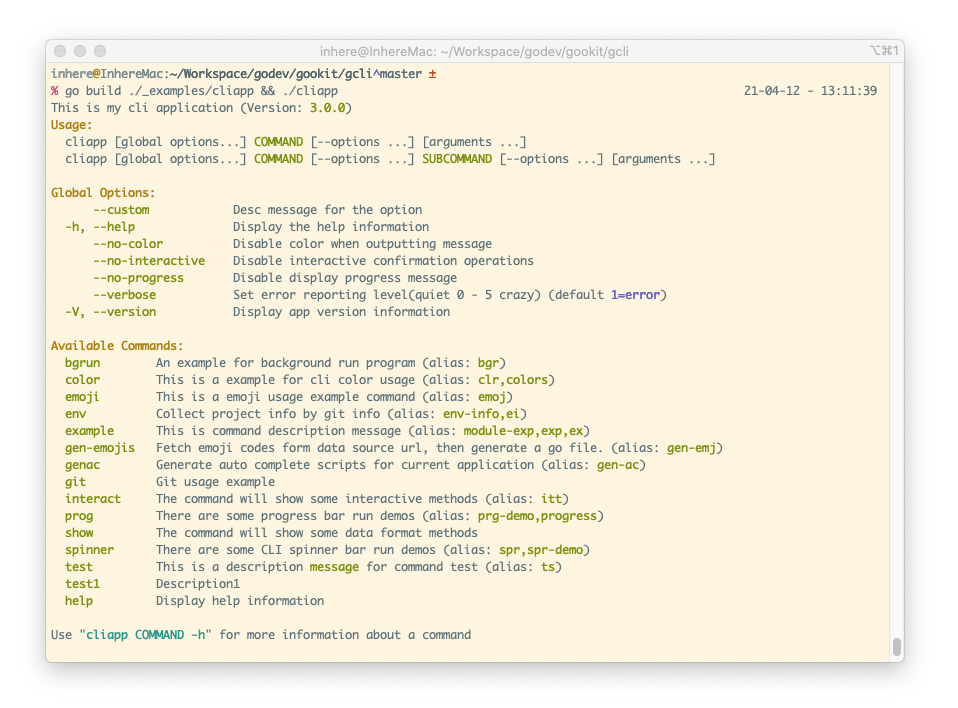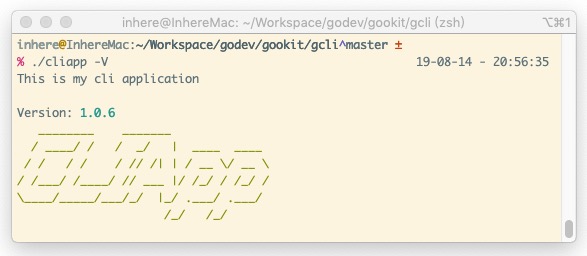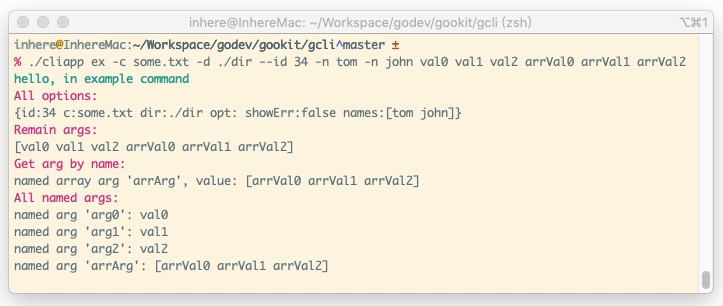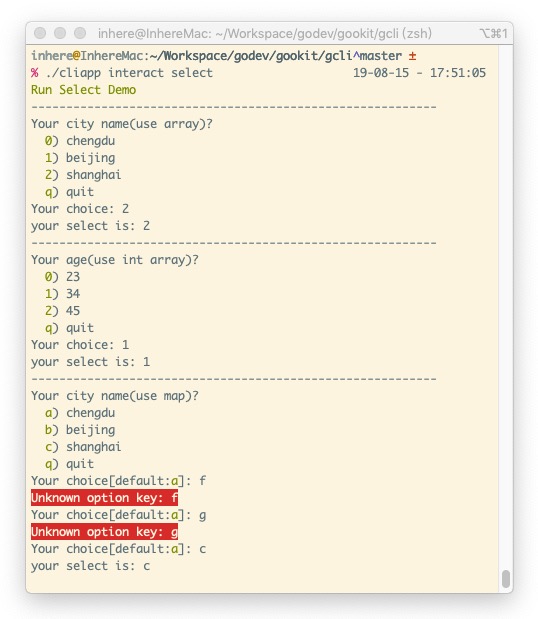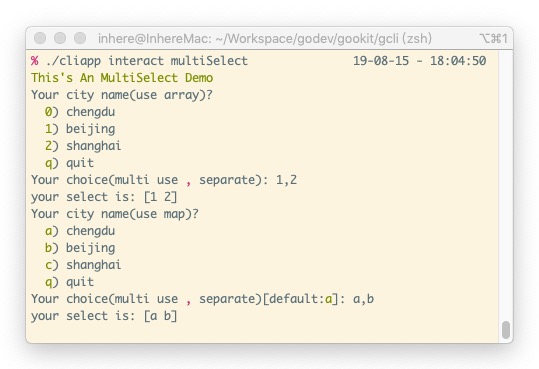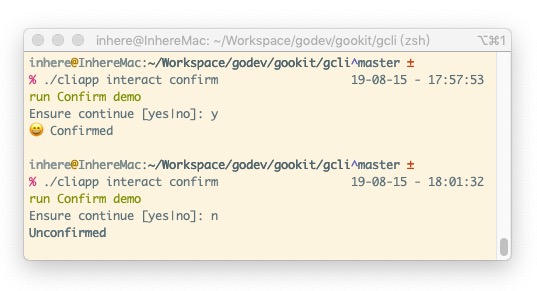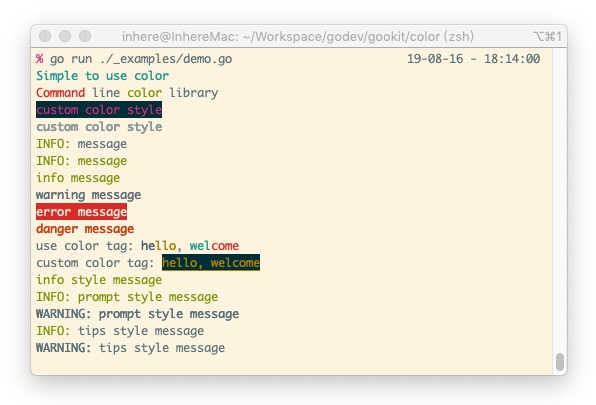gookit / Gcli
Programming Languages
Projects that are alternatives of or similar to Gcli
GCli
A simple-to-use command line application, written using golang.
中文说明
中文说明请看 README.zh-CN
Screenshots
Features
- Simple to use
- Support for adding multiple commands and supporting command aliases
- Support binding command options from structure
- example
flag:"name=int0;shorts=i;required=true;desc=int option message"
- example
- Support for adding multi-level commands, each level of command supports binding its own options
-
option/flag- support option binding--long, support for adding short options(-s)- POSIX-style short flag combining (
-a -b=-ab) - Support setting
Required, indicating a required option parameter - Support setting
Validator, which can customize the validation input parameters
- POSIX-style short flag combining (
-
argument- support binding argument to specify name- Support
required, optional,arraysettings - It will be automatically detected and collected when the command is run.
- Support
-
colorable- supports rich color output. provide by gookit/color- Supports html tab-style color rendering, compatible with Windows
- Built-in
info, error, success, dangerand other styles, can be used directly
-
interactBuilt-in user interaction methods:ReadLine,Confirm,Select,MultiSelect... -
progressBuilt-in progress display methods:Txt,Bar,Loading,RoundTrip,DynamicText... - Automatically generate command help information and support color display
- When the command entered is incorrect, a similar command will be prompted(including an alias prompt)
- Supports generation of
zshandbashcommand completion script files - Supports a single command as a stand-alone application
GoDoc
Install
go get github.com/gookit/gcli/v3
Quick start
package main
import (
"runtime"
"github.com/gookit/gcli/v3"
"github.com/gookit/gcli/v3/_examples/cmd"
)
// for test run: go build ./_examples/cliapp.go && ./cliapp
func main() {
app := gcli.NewApp()
app.Version = "1.0.3"
app.Desc = "this is my cli application"
// app.SetVerbose(gcli.VerbDebug)
app.Add(cmd.ExampleCommand())
app.Add(&gcli.Command{
Name: "demo",
// allow color tag and {$cmd} will be replace to 'demo'
Desc: "this is a description <info>message</> for {$cmd}",
Aliases: []string{"dm"},
Func: func (cmd *gcli.Command, args []string) error {
gcli.Print("hello, in the demo command\n")
return 0
},
})
// .... add more ...
app.Run()
}
Usage
- build a demo package
% go build ./_examples/cliapp.go
Display version
% ./cliapp --version
# or use -V
% ./cliapp -V
Display app help
by
./cliappor./cliapp -hor./cliapp --help
Examples:
./cliapp
./cliapp -h # can also
./cliapp --help # can also
Run Command
./cliapp COMMAND [--OPTION VALUE -S VALUE ...] [ARGUMENT0 ARGUMENT1 ...]
% ./cliapp example -c some.txt -d ./dir --id 34 -n tom -n john val0 val1 val2 arrVal0 arrVal1 arrVal2
you can see:
Display Command Help
by
./cliapp example -hor./cliapp example --help
Error Command Tips
Generate Auto Completion Scripts
import "github.com/gookit/gcli/v3/builtin"
// ...
// add gen command(gen successful you can remove it)
app.Add(builtin.GenAutoComplete())
Build and run command(This command can be deleted after success.):
% go build ./_examples/cliapp.go && ./cliapp genac -h // display help
% go build ./_examples/cliapp.go && ./cliapp genac // run gen command
will see:
INFO:
{shell:zsh binName:cliapp output:auto-completion.zsh}
Now, will write content to file auto-completion.zsh
Continue? [yes|no](default yes): y
OK, auto-complete file generate successful
After running, it will generate an
auto-completion.{zsh|bash}file in the current directory, and the shell environment name is automatically obtained. Of course you can specify it manually at runtime
Generated shell script file ref:
- bash env auto-completion.bash
- zsh env auto-completion.zsh
Preview:
Write a command
Quick add
app.Add(&gcli.Command{
Name: "demo",
// allow color tag and {$cmd} will be replace to 'demo'
Desc: "this is a description <info>message</> for command {$cmd}",
Aliases: []string{"dm"},
Func: func (cmd *gcli.Command, args []string) error {
gcli.Print("hello, in the demo command\n")
return nil
},
})
Write go file
the source file at: example.go
package cmd
import (
"fmt"
"github.com/gookit/color"
"github.com/gookit/gcli/v3"
)
// options for the command
var exampleOpts = struct {
id int
c string
dir string
opt string
names gcli.Strings
}{}
// ExampleCommand command definition
var ExampleCommand = &gcli.Command{
Name: "example",
Desc: "this is a description message",
Aliases: []string{"exp", "ex"}, // 命令别名
// {$binName} {$cmd} is help vars. '{$cmd}' will replace to 'example'
Examples: `{$binName} {$cmd} --id 12 -c val ag0 ag1
<cyan>{$fullCmd} --names tom --names john -n c</> test use special option`,
Config: func(c *gcli.Command) {
// 绑定命令选项信息
c.IntOpt(&exampleOpts.id, "id", "", 2, "the id option")
c.StrOpt(&exampleOpts.c, "config", "c", "value", "the config option")
// notice `DIRECTORY` will replace to option value type
c.StrOpt(&exampleOpts.dir, "dir", "d", "", "the `DIRECTORY` option")
// 支持设置选项短名称
c.StrOpt(&exampleOpts.opt, "opt", "o", "", "the option message")
// 支持绑定自定义变量, 但必须实现 flag.Value 接口
c.VarOpt(&exampleOpts.names, "names", "n", "the option message")
// 绑定命令参数信息,按参数位置绑定
c.AddArg("arg0", "the first argument, is required", true)
c.AddArg("arg1", "the second argument, is required", true)
c.AddArg("arg2", "the optional argument, is optional")
c.AddArg("arrArg", "the array argument, is array", false, true)
},
Func: exampleExecute,
}
// 命令执行主逻辑代码
// example run:
// go run ./_examples/cliapp.go ex -c some.txt -d ./dir --id 34 -n tom -n john val0 val1 val2 arrVal0 arrVal1 arrVal2
func exampleExecute(c *gcli.Command, args []string) error {
fmt.Print("hello, in example command\n")
magentaln := color.Magenta.Println
magentaln("All options:")
fmt.Printf("%+v\n", exampleOpts)
magentaln("Raw args:")
fmt.Printf("%v\n", args)
magentaln("Get arg by name:")
arr := c.Arg("arrArg")
fmt.Printf("named array arg '%s', value: %v\n", arr.Name, arr.Value)
magentaln("All named args:")
for _, arg := range c.Args() {
fmt.Printf("named arg '%s': %+v\n", arg.Name, *arg)
}
return nil
}
- display the command help:
go build ./_examples/cliapp.go && ./cliapp example -h
Bind Option(flag)
Available methods:
BoolOpt(p *bool, name, shorts string, defValue bool, desc string)
BoolVar(p *bool, meta FlagMeta)
Float64Opt(p *float64, name, shorts string, defValue float64, desc string)
Float64Var(p *float64, meta FlagMeta)
Int64Opt(p *int64, name, shorts string, defValue int64, desc string)
Int64Var(p *int64, meta FlagMeta)
IntOpt(p *int, name, shorts string, defValue int, desc string)
IntVar(p *int, meta FlagMeta)
StrOpt(p *string, name, shorts, defValue, desc string)
StrVar(p *string, meta FlagMeta)
Uint64Opt(p *uint64, name, shorts string, defValue uint64, desc string)
Uint64Var(p *uint64, meta FlagMeta)
UintOpt(p *uint, name, shorts string, defValue uint, desc string)
UintVar(p *uint, meta FlagMeta)
Var(p flag.Value, meta FlagMeta)
VarOpt(p flag.Value, name, shorts, desc string)
Usage examples:
var id int
var b bool
var opt, dir string
var f1 float64
var names gcli.Strings
// bind options
cmd.IntOpt(&id, "id", "", 2, "the id option")
cmd.BoolOpt(&b, "bl", "b", false, "the bool option")
// notice `DIRECTORY` will replace to option value type
cmd.StrOpt(&dir, "dir", "d", "", "the `DIRECTORY` option")
// setting option name and short-option name
cmd.StrOpt(&opt, "opt", "o", "", "the option message")
// setting a special option var, it must implement the flag.Value interface
cmd.VarOpt(&names, "names", "n", "the option message")
Bind Argument
About arguments:
- Required argument cannot be defined after optional argument
- Only one array parameter is allowed
- The (array)argument of multiple values can only be defined at the end
Available methods:
Add(arg Argument) *Argument
AddArg(name, desc string, requiredAndIsArray ...bool) *Argument
AddArgument(arg *Argument) *Argument
BindArg(arg Argument) *Argument
Usage examples:
cmd.AddArg("arg0", "the first argument, is required", true)
cmd.AddArg("arg1", "the second argument, is required", true)
cmd.AddArg("arg2", "the optional argument, is optional")
cmd.AddArg("arrArg", "the array argument, is array", false, true)
can also use Arg()/BindArg():
cmd.Arg("arg0", gcli.Argument{
Name: "ag0",
Desc: "the first argument, is required",
Require: true,
})
cmd.BindArg("arg0", gcli.Argument{
Name: "ag0",
Desc: "the second argument, is required",
Require: true,
})
cmd.Arg("arg2", gcli.Argument{
Name: "ag0",
Desc: "the third argument, is is optional",
})
cmd.BindArg("arrArg", gcli.Argument{
Name: "arrArg",
Desc: "the third argument, is is array",
IsArray: true,
})
Progress display
Package progress provide terminal progress bar display.
Such as: Txt, Bar, Loading, RoundTrip, DynamicText ...
-
progress.Barprogress bar
Demo: ./cliapp prog bar
-
progress.Txttext progress bar
Demo: ./cliapp prog txt
-
progress.LoadBarpending/loading progress bar
-
progress.Countercounter -
progress.RoundTripround trip progress bar
[=== ] -> [ === ] -> [ === ]
-
progress.DynamicTextdynamic text message
Examples:
package main
import (
"time"
"github.com/gookit/gcli/v3/progress"
)
func main() {
speed := 100
maxSteps := 110
p := progress.Bar(maxSteps)
p.Start()
for i := 0; i < maxSteps; i++ {
time.Sleep(time.Duration(speed) * time.Millisecond)
p.Advance()
}
p.Finish()
}
more demos please see progress_demo.go
run demos:
go run ./_examples/cliapp.go prog txt
go run ./_examples/cliapp.go prog bar
go run ./_examples/cliapp.go prog roundTrip
Interactive methods
console interactive methods
interact.ReadInputinteract.ReadLineinteract.ReadFirstinteract.Confirminteract.Select/Choiceinteract.MultiSelect/Checkboxinteract.Question/Askinteract.ReadPassword
Examples:
package main
import (
"fmt"
"github.com/gookit/gcli/v3/interact"
)
func main() {
username, _ := interact.ReadLine("Your name?")
password := interact.ReadPassword("Your password?")
ok := interact.Confirm("ensure continue?")
if !ok {
// do something...
}
fmt.Printf("username: %s, password: %s\n", username, password)
}
Read Input
read user input message
ans, _ := interact.ReadLine("Your name? ")
if ans != "" {
color.Println("Your input: ", ans)
} else {
color.Cyan.Println("No input!")
}
Select/Choice
ans := interact.SelectOne(
"Your city name(use array)?",
[]string{"chengdu", "beijing", "shanghai"},
"",
)
color.Comment.Println("your select is: ", ans)
Multi Select/Checkbox
ans := interact.MultiSelect(
"Your city name(use array)?",
[]string{"chengdu", "beijing", "shanghai"},
nil,
)
color.Comment.Println("your select is: ", ans)
Confirm Message
if interact.Confirm("Ensure continue") {
fmt.Println(emoji.Render("😄 Confirmed"))
} else {
color.Warn.Println("Unconfirmed")
}
Read Password
pwd := interact.ReadPassword()
color.Comment.Println("your input password is: ", pwd)
CLI Color
Terminal color use gookit/color Support windows
cmd.exepowerShell
- Color output display
Usage
package main
import (
"github.com/gookit/color"
)
func main() {
// simple usage
color.Cyan.Printf("Simple to use %s\n", "color")
// internal theme/style:
color.Info.Tips("message")
color.Info.Prompt("message")
color.Info.Println("message")
color.Warn.Println("message")
color.Error.Println("message")
// custom color
color.New(color.FgWhite, color.BgBlack).Println("custom color style")
// can also:
color.Style{color.FgCyan, color.OpBold}.Println("custom color style")
// use defined color tag
color.Print("use color tag: <suc>he</><comment>llo</>, <cyan>wel</><red>come</>\n")
// use custom color tag
color.Print("custom color tag: <fg=yellow;bg=black;op=underscore;>hello, welcome</>\n")
// set a style tag
color.Tag("info").Println("info style text")
// prompt message
color.Info.Prompt("prompt style message")
color.Warn.Prompt("prompt style message")
// tips message
color.Info.Tips("tips style message")
color.Warn.Tips("tips style message")
}
More usage
- Basic color
color.Bold.Println("bold message")
color.Yellow.Println("yellow message")
- Extra themes
color.Info.Println("Info message")
color.Danger.Println("Danger message")
color.Error.Println("Error message")
color.Success.Println("Success message")
- Use like html tag
Support working on windows
cmd.exepowerShell
// use style tag
color.Print("<suc>he</><comment>llo</>, <cyan>wel</><red>come</>")
color.Println("<suc>hello</>")
color.Println("<error>hello</>")
color.Println("<warning>hello</>")
// custom color attributes
color.Print("<fg=yellow;bg=black;op=underscore;>hello, welcome</>\n")
For more information on the use of color libraries, please visit gookit/color
Gookit packages
- gookit/ini Go config management, use INI files
- gookit/rux Simple and fast request router for golang HTTP
- gookit/gcli build CLI application, tool library, running CLI commands
- gookit/event Lightweight event manager and dispatcher implements by Go
- gookit/cache Generic cache use and cache manager for golang. support File, Memory, Redis, Memcached.
- gookit/config Go config management. support JSON, YAML, TOML, INI, HCL, ENV and Flags
- gookit/color A command-line color library with true color support, universal API methods and Windows support
- gookit/filter Provide filtering, sanitizing, and conversion of golang data
- gookit/validate Use for data validation and filtering. support Map, Struct, Form data
- gookit/goutil Some utils for the Go: string, array/slice, map, format, cli, env, filesystem, test and more
- More please see https://github.com/gookit
See also
-
inhere/consolehttps://github/inhere/php-console -
issue9/termhttps://github.com/issue9/term -
beego/beehttps://github.com/beego/bee - ANSI escape code
License
MIT



